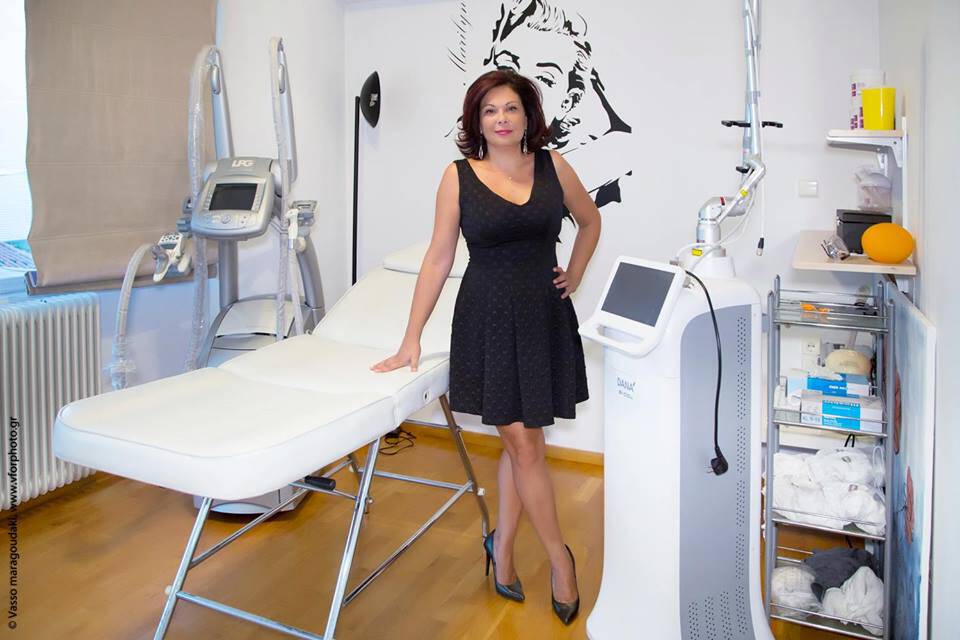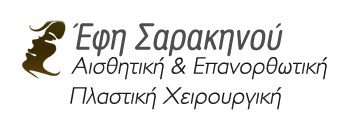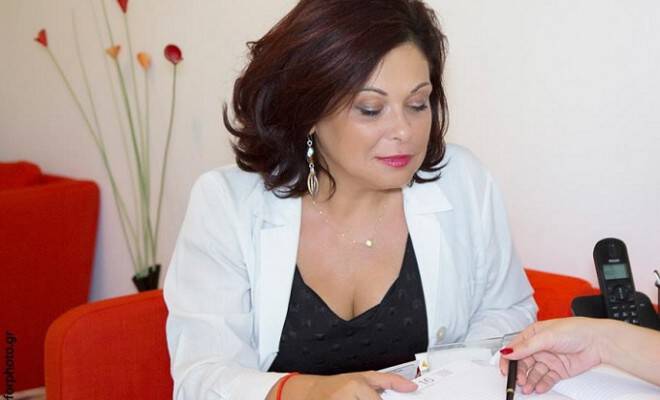“Crisis does not stop the Greeks’ love for the beauty. On the contrary, we now have feel more the need to offer ourselves what pleases us. And Plastic Surgery is evolving dynamically and offers modern solutions, to address every request.”
Follows an enlightening interview of Dr. Efi Sarakinou, a plastic surgeon with international prestige and degrees, a member of the Royal College of Surgeons of England (FRCS) and the European Association of Plastic, Reconstructive and Aesthetic Surgery (EBOPRAS).
Mrs. Sarakinou spoke to metamorphosis.com.gr about the modern techniques that serve beauty, anti-aging and harmonious appearance, while special mention was made of the possibilities that Plastic Surgery now offers in the restoration of mastectomies and tissue regeneration.

Q: Plastic Surgery is considered one of the newest in the Medical field and at the same time one of the fastest developing. How demanding is it in practice for a Plastic Surgeon to stay well informed about new techniques and how important is this for those who turn to him?
People have the feeling that the history of plastic surgery begins in recent years, however, in reality, its past is much longer. Physical deformities have concerned mankind since ancient times. Methods of plastic surgery restoration are mentioned in Sanskrit writing in Indian papyri, which date from the 5th – 6th century BC. Similar references exist in various other cultures, such as the Persians, the Phoenicians and the Greeks. The first comprehensive book on plastic surgery was published during the Renaissance (1587), by Gaspare Tagliacozzi, who was excommunicated for it by the Catholic Church, because it was considered that the techniques he described insulted the Church and the Creator. In the first half of the twentieth century, plastic surgery began to develop substantially. Contributing to this were the two world wars, which created enormous needs for the rehabilitation of patients, mainly due to injuries. The first Greek Plastic Surgery Clinic was founded in 1952. It is a field that is constantly developing, changing and improving, not only in terms of surgical technique but also through extensive research into the creation of innovative materials, such as silicone and hyaluronic acid. The continuous information and training of the plastic surgeon in today’s era is done through conferences and educational seminars and are really necessary to be able to respond to the modern needs of patients, who in turn are much more informed than in the past through the media information and social networking and consequently much more demanding.
Q: During your studies you specialized in burn rehabilitation in Great Britain and reconstructive breast surgery, areas that show that beyond the case of beauty, plastic surgery also offers a service to good psychology and to the rehabilitation of patients suffering from an accident or a deformity. How does a surgeon feel when he restores a normal appearance to a patient who has been tested by an extensive burn or a mastectomy?
Reconstructive surgery in today’s age truly works wonders. This has also been helped by the advancement of technology with the creation of materials, such as artificial skin and silicone inserts. Patients who were previously condemned to live on the sidelines with major deformities, either from birth or due to injuries or after mutilating operations for cancer. The possibility of rehabilitation given to these patients today improves not only the external appearance and makes them acceptable in the environment but has a maximum effect on psychology. It offers them the opportunity to move forward in their lives with confidence, to work, to create bonds, to have a family.
For the plastic surgeon, the reward is the satisfaction and joy he receives and the pride he feels for his patients. It does not compare to any monetary reward and very often these operations are done pro bono. Also, more often than not the relationship that develops between patient and surgeon is a lifelong relationship that lasts for many years.
Q: In particular, the breast is considered one of the most important symbols of femininity. How easy or difficult can it be to restore it after a mastectomy or even because of an injustice that … caused by nature to some women?
Indeed the breast is a symbol of femininity in our society. It is inextricably linked to woman’s sexuality and motherhood. And if someone thinks that breast cancer is purely a female issue, let them take into account that it can concern their mother, their wife or their daughter. Like any surgery, of course, it has its difficulties. Breast reconstruction after mastectomy for each woman is individualized. There are different surgical methods and often the decision is made by the woman herself, her plastic surgeon, the oncologist and the partner. It is a team effort and it needs the support of the environment to cope with the difficult process. The results with modern methods are amazing both in terms of appearance and the emotional and psychological recovery of the patient, who ceases to feel crippled and can continue her life with optimism and self-confidence. In today’s era, the possibility of breast reconstruction surgery should be provided to all women facing the problem. It is the duty of the state and society, not personal. The breast, in addition to malignancy, can present other deformities. Usually these cases concern the young woman who in adolescence watches her breasts change but not develop in a normal way. Uneven size, strange shape, too small or too big breasts are some problems, for which a young lady will seek the help of the plastic surgeon. Our goal is to restore the size, shape to fit the girl’s body. The results are usually very satisfactory.
Q: From your experience, what is the relationship of Greeks with plastic surgery and cosmetic procedures?
Greek men and women are afraid of disfigurement, like any human being, but not of plastic surgery, the results of which they appreciate positively when they experience it. Unfortunately, incomplete and often falsified information brings to light cases that, for some reason, had a bad result. For each of these cases, however, there are thousands of others with a satisfactory result. In Greece, aesthetic plastic surgery is not as widespread as in other countries of the western world. There is a clear differentiation between the big cities and the countryside with the latter being significantly disadvantaged, both in accessibility and in plastic surgery and information services. There is also the fear of criticism from the social environment and often from the family itself. Age is also a negative factor, with the result that many women, especially older women, live for years with aesthetic problems and the belief that they are too old to improve them. However, in recent years, more and more Greeks come into contact with aesthetic plastic surgery and know its services. What is really needed is for Greek men and women to be more informed and not be satisfied with half measures. They need to know and take advantage of all that the plastic surgeon has to offer today, and there is a lot.
Q: As a Scientist serving the human appearance, do you consider that beauty is the modern “key” to success (professional and personal)?
Social norms strongly influence our relationships with the people around us and with ourselves. Beauty since ancient times was involved with such standards and for whoever possessed it, it was an advantage. People who have been generously endowed by nature have achieved a lot in their lives. Clearly good looks, beautiful features and charm in our professional and personal contacts give advantages over the less favored. Women and men have always used many ways to enhance their appearance with clothing, makeup and hairstyle being the simplest. But with today’s use of the possibilities provided by plastic surgery, either through cosmetic surgeries such as breast augmentation, or aesthetic interventions such as Botox and in several cases reconstructive surgeries, the person’s image enjoys a scientific, personalized care.
It is certain, however, that a beautiful appearance alone is not a guarantee for success. It must be combined with knowledge, experience, intelligence and emotional intelligence. Otherwise, we see beautiful women being exploited. In today’s age, the possibilities that aesthetic plastic surgery gives in combination with exercise, proper nutrition, protection from the sun and other harmful factors, in a charming personality, is an irresistible combination. It is this beauty that characterizes the woman or the man up to the most mature ages.
Q: Modern Plastic Surgery now has solutions for every problem and every wish or does it remain… the privilege of the few?
The evolution of plastic surgery in the last 50 years is leaps and bounds. Not only have surgical techniques evolved, but also research at the gene and cellular level, aimed at tissue regeneration and anti-aging, offers promising messages. There are techniques, materials and treatments that are available to an ever-increasing part of the population. As for the cost, it is never prohibitive, often much less than what is speculated. The idea is that plastic surgery, not only reconstructive but also aesthetic, should be a provision of the social health system, since it contributes to the psychosomatic health of the individual. Because, a person is not only the breast, the leg or the hand, it is also the psychology, the dignity, the self-confidence, the reflection in the mirror.
However, the crisis that we are going through in Greece in recent years has had a negative effect on the financial ability of many to take care of needs beyond the absolutely necessary.
Q: In particular in matters of mastectomies – which unfortunately concern more and more women – what are the costs of the restoration and what kind of methods are used?
The percentage of women affected by breast cancer is unfortunately high. It most commonly concerns older women who do not progress to recovery, not only because of age, but more commonly due to negative influence from the medical and social environment. The surgeon and the oncologist are the ones who will direct the woman to the plastic surgeon for the recovery and the family environment will support her. The state will help her. Subsequently, the method of breast reconstruction will be decided for each patient individually, depending on the stage of the disease, the type of mastectomy, the accompanying treatments needed. Essentially, the restoration can be done either with the use of tissues from the abdomen or the back, the so-called flaps, or with the use of tissue expanders and silicone inserts. Usually 2-3 operations are needed to complete the repair which also includes the creation of a new nipple. One of the most important developments is the possibility for a large percentage of patients to proceed to immediate rehabilitation at the same time as the mastectomy.
Regarding the cost, a percentage is covered by the patients’ state insurance, but even in the private sector, the cost list is by no means prohibitive. Serious efforts are being made by doctors and nursing institutions as well as by non-governmental organizations such as Europa Donna and Alma Zois to ensure that all patients have access to rehabilitation procedures, not only through continuous information but also with financial and psychosocial assistance.
Q: Beauty treatments and anti-aging have been gaining more and more ground in recent years. Which ones do you consider more effective and at what ages do you recommend them?
In the leaps and bounds of cosmetic plastic surgery today and with the plethora of anti-aging cocktails out there, it might be simplistic to argue that Botox treatment really is the one with the most spectacular results. And yet it renews the entire face, rests the eye area, softens expression wrinkles. It is therefore not surprising that it is the most widespread treatment worldwide.
Facial lipotransfer and the use of stem cells has been rapidly gaining ground in recent years. It is easy, painless, bloodless and with impressive results in terms of tissue regeneration and face lifting. A modern technique is also the placement of threads of various types, usually absorbable, which act through the production of collagen. What one needs to know is that the combination of treatments has infinitely better results than each one individually. In terms of age, clearly some treatments work better at younger ages. Usually at the age of thirty it is good to start with some hydration, tightening and laser resurfacing treatments. At older ages the main problem is tissue relaxation, for which the most appropriate treatment is surgery, e.g. eyelid surgery and face lift. In any case it is important to trust an experienced plastic surgeon who will propose customised solutions.

Q: Plastic surgery taboos seem to be falling all the time. This creates an increasingly crowded “market” looking for aesthetic restoration products and services. But what about safe specifications and specialized personnel? Are there standards that we should all keep in mind?
Truly our age is flooded with products, treatments, nutritional supplements, anti-aging cocktails and centers that promise miracles. Aesthetic treatments of various kinds are also offered in beauty centers, hair salons, massage parlors and via the Internet. Advertising is often misleading, promising miracles for little cost, a sign of our times and this, often leading to the discrediting of services, treatments and professionals, who are worthy and competent. If the result of these services is disappointing, ineffective or even harmful for the patient, it is undoubtedly a very bad experience that affects not only him but also his environment, and creates a negative impression on the field of aesthetic plastic surgery.
But we must know that there are specific control organizations, not only Greek, but European and global, that control the products and the professionals who manage them. So when it comes to the various treatments, whether it’s simple creams that one can get from the supermarket or the pharmacy or the injectables e.g. mesotherapy or hyaluronic acid, must definitely have the approval of either the American FDA, or the corresponding EOF in Greece, or the European control mechanism. Anything else is at best inactive and at worst a health hazard. Regarding the professionals in the field of aesthetics, it is good to check their certification. In 1969, the Society of Plastic & Reconstructive Surgery was founded in Greece, whose primary purpose is to contribute to the promotion of Plastic Surgery, as a health and beauty factor. Its members are plastic and reconstructive surgeons active in Greece.

Q: Do you think that the economic crisis inhibits the willingness of Greeks to deal with their appearance and improve it, or is it the other way around? Is there a downturn due to crisis in your sector?
Undoubtedly, the love of the Greeks for the beautiful is not inhibited. The daily work and the struggle of dealing with the financial problems that man can face nowadays are not, and should not be, the only elements that make up his personality. He needs the pleasure of pampering and beauty treatments, just as he needs a book, an evening with friends, a good movie, a trip. We could say that in today’s age the Greek has even more need to offer himself what pleases him and beauty treatments certainly boost self-confidence and good mood, as a result of which we are more dynamic and able to face difficulties, either on a personal level or on a social and work level. In the field of aesthetics there is a bend like in most fields today, but on the other hand patients have become more informed and demanding, which really helps our work. They are looking for the best treatments from the best professionals in the field and this has the effect of improving the entire provision of services in the field of beauty.
Q: Umberto Eco said that “beauty will save us”. Greece has a centuries-old tradition of beauty standards. From your experience, does the appearance of Greeks retain elements of ancient Greek beauty or does it turn to foreign standards?
All creation, from the tiny grain of sand to the stars, is infinitely beautiful. Man, as a being, is beautiful in his construction and beauty exists everywhere around us, in emotions, in music, in art, in creation. Seeking beauty is like seeking the normal, that which follows the rules of harmony, life itself. I believe that the ancient Greek standards of beauty were not only based on appearance but also on the elevation of body and soul through sports and philosophy.
Strictly speaking, Greeks tend to follow Western standards of beauty. In today’s times, e.g. the model of beauty for women is the Kardashians and we often have Greek women who seek this silhouette. Tomorrow may be something different. Generally the bombardment we receive through the mass media is turning us more towards American standards with all that entails. In any case, it is much wiser to look for what suits each of us individually, and the plastic surgeon can help us significantly. There are not a few cases where patients present themselves to the doctor’s office with a photo of a famous person, for example asking for Angelina Jolie’s lips or Nicole Kidman’s nose. The role of the plastic surgeon is to offer each patient what suits them. As we never give botox to two different patients in the same way, but we personalize the treatment with the same knowledge and criteria, we treat each patient as separate, with their own special characteristics.

Q: You are a member of the Royal College of Surgeons of England (FRCS) and the European Association of Plastic, Reconstructive and Aesthetic Surgery (EBOPRAS), which are great credentials for a Greek surgeon. How did you choose your Science?
It was certainly a difficult course, but all the sacrifices required – and there were many – were worth it, and for that reason I have no regrets. Certainly for a woman the field of surgery is more demanding than for a man. A woman combines family and work and must prove herself capable of both.
I think I was drawn to surgery from my early years in medical school. When it comes to plastic surgery, what fascinates me is the ability to imagine something and create it. It’s like sculpting a sculpture. You start from the prototype and highlight the most beautiful and harmonious elements. Because that’s what plastic surgery is, whether cosmetic or reconstructive. You highlight or create what is lacking or escape from the normal (because the normal is the beautiful), you reconstruct what has been destroyed, you restore harmony to the human face and body. It is also very important for me that I have the opportunity to work mainly with women. I believe that I can perceive very well, understand the needs of my patients, put myself in their shoes and take care of them. Besides, I have similar needs, concerns and requirements.
Source: metamorphosis.com.gr, Interview to Mrs. Marianna Kornarou


